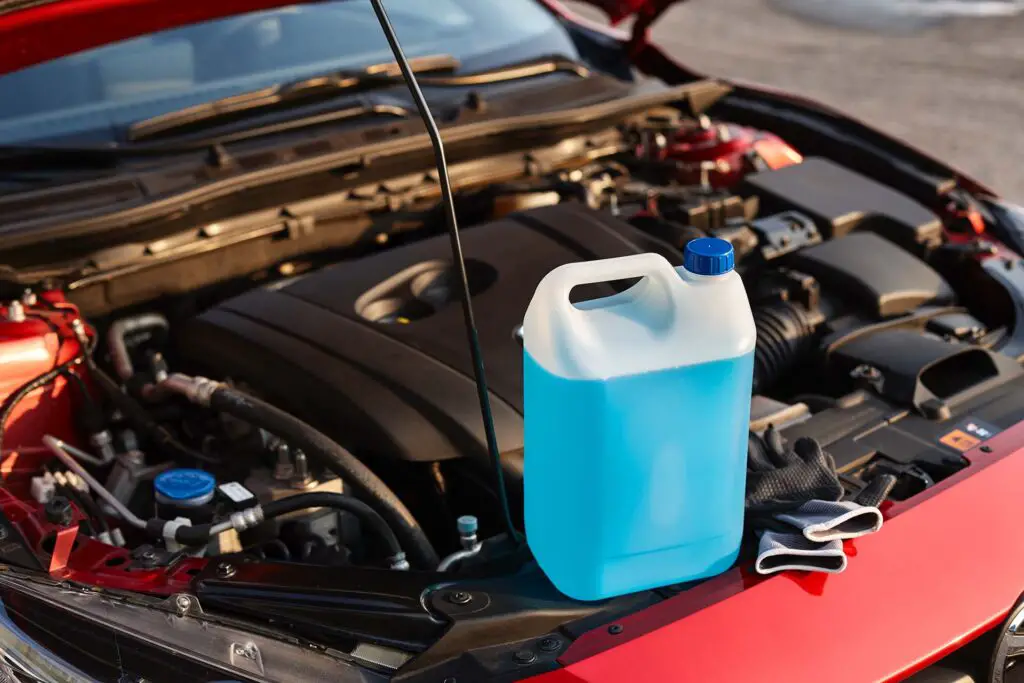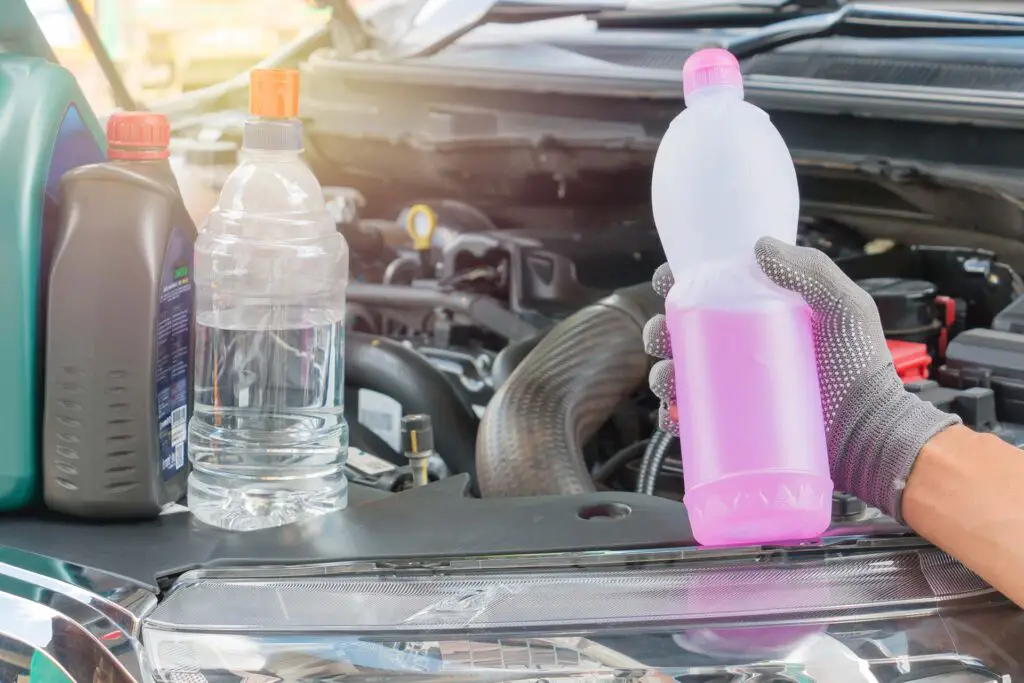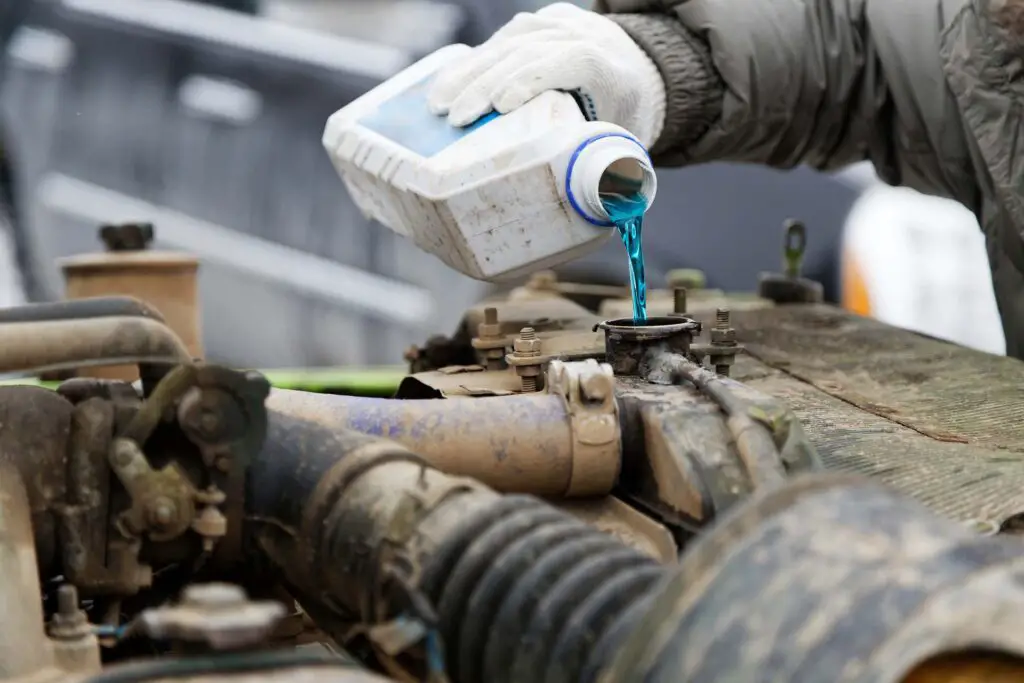Every dedicated gearhead has asked themselves this question at some point – what type of antifreeze does my car need? After all, it keeps your four-wheeled companion running smoothly for miles on end. So, let’s dive right into the ins and outs of this magical elixir and learn all about the best ways to keep your engine cool on the road.
Factors such as engine type, manufacturer specifications, and climate conditions should influence your choice between ethylene glycol, propylene glycol, or hybrid coolant. Online resources, manufacturer websites, and consulting professionals can help you make that decision. All by ensuring you have a choice that will provide efficient cooling and engine longevity.
What Is Antifreeze?
Picture this – you’re cruising down the famous routes in the US with your trusty vehicle humming along. But beneath the hood, a symphony of metal parts is hard at work, generating an impressive amount of heat. Enter antifreeze, the unsung hero that ensures your engine stays within its optimal temperature range.
What Is the Purpose of Antifreeze?
Antifreeze, also known as coolant, is a specially formulated liquid that regulates your engine’s temperature. It’s composed of a mixture of ethylene or propylene glycol and water, along with various additives that enhance its performance. As the name suggests, this handy liquid prevents the water in the engine’s cooling system from freezing, which can potentially cause irreversible damage to your trusted ride.
But this isn’t just a cold-weather warrior – it’s equally essential when the summer sun scorches the pavement. It raises the boiling point of the coolant, preventing your engine from overheating and helping it to remain cool even during the hottest days.
In addition to temperature regulation, this liquid lubricates certain components and prevents corrosion, keeping your engine healthy and extending its lifespan. It sounds like having the best antifreeze coolant in your garage should be considered every driver’s responsibility, right?

Factors Influencing the Type of Antifreeze Your Car Needs
As you can gather by now, adding the right coolant to your vehicle is not just a matter of ticking off another maintenance box – it’s crucial for the well-being of your ride’s engine. So, let’s explore the factors that influence the type of antifreeze your four-wheeler needs and ensure you’re ready to hit the road without a hitch.
Vehicle Manufacturer’s Specifications
When it comes to selecting the perfect fit for your vehicle, there’s no better source of guidance than your car’s manufacturer. After all, they know your four-wheeler inside out and have specific recommendations tailored to its unique needs.
And this treasure trove of information can be found right there, waiting for you in the glove compartment – the owner’s manual. This useful guide provides valuable insights into the recommended coolant type, concentration, and any specific additives you should consider.
Engine Type and Design
Engines come in different flavors, and their preferences for keeping the engine cool can vary as well. So, if you’re wondering what is the best antifreeze for diesel engines, the answer might be quite different than what’s generally recommended for, let’s say, electric vehicles.
Here’s what’s usually recommended for each engine type:
| Engine Type | Recommended Coolant Type |
| Gasoline | Conventional green antifreeze (ethylene glycol-based) |
| Diesel | Long-life coolant (hybrid organic acid technology) |
| Hybrid | Can vary, so it’s best to consult the manufacturer’s recommendations |
| Electric | Specialized coolants formulated for electric drivetrains |
Climate and Environmental Conditions
Your geographical location and prevailing climate also play a significant role in determining the type of coolant your four-wheeler needs. In colder climates, where temperatures plummet below freezing, you’ll need a product that has a lower freezing point. Coolants with higher concentrations of ethylene glycol or propylene glycol are commonly used in these regions to prevent engine damage caused by freezing.
On the other hand, in places where scorching heat is the norm, you’ll need antifreeze that can withstand high temperatures without boiling over. Therefore, coolants with a higher boiling point and superior heat transfer properties are the way to go if you live in warmer climates.

Types of Antifreeze and Their Characteristics
Just as there are different types of engines powering our beloved vehicles, there are also various types of coolant available to keep those engines running smoothly. No matter if it’s through one of the cities with the worst drivers or for an off-road driving adventure.
The choice of antifreeze is not a one-size-fits-all situation. It’s influenced by engine type, manufacturer recommendations, and desired performance. So, let’s explore the characteristics of different antifreeze types, ensuring you make an informed decision for your car’s needs:
Ethylene Glycol Antifreeze
This is the most commonly used type, and you’ll likely recognize it by its distinct green color. It boasts excellent heat transfer properties, allowing it to effectively absorb and dissipate engine heat. This coolant also provides robust protection against freezing, making it well-suited for gasoline engines operating in cold climates.
One of the notable benefits of ethylene glycol coolant is its exceptional corrosion protection. As it contains additives that help prevent the formation of rust and scale within the engine’s cooling system. All by safeguarding critical components such as the radiator and water pump. Moreover, this liquid acts as a lubricant, reducing wear and tear on the water pump seals and other moving parts. Just make sure it’s handled with caution, as this type of coolant is extremely poisonous.
Propylene Glycol Antifreeze
Propylene glycol is a popular alternative to ethylene glycol, often distinguishable by its pink or orange color. Like its counterpart, it exhibits excellent heat transfer capabilities and also provides reliable protection against freezing, making it suitable for a wide range of applications. However, what sets it apart is its lower toxicity. While still not completely harmless, it poses a reduced risk to humans, animals, and the environment.
In addition to freeze protection and heat transfer properties, propylene glycol offers good corrosion protection for engine components. Still, it’s worth noting that it may have slightly lower performance compared to ethylene glycol coolant. So proper attention should be given to coolant system maintenance and ensuring the cooling system is functioning optimally.
Hybrid Antifreeze (Ethylene-Propylene Mix)
Last but not least, hybrid coolant combines the desirable characteristics of both ethylene glycol and propylene glycol. This blend offers a balanced solution, particularly useful for hybrid vehicles and situations where compatibility with different engine types is important. That’s because it provides a broad range of protection, making it suitable for gasoline, diesel, and some electric vehicle cooling systems.
Hybrid coolant can be compatible with various engine types. This is convenient for those who own multiple vehicles, from small city cars to big family SUVs. However, refer to the manufacturer’s recommendations to ensure the specific hybrid formulation aligns with your four-wheeler’s requirements.
Antifreeze Color and Compatibility
This magical elixir comes in a variety of colors, which might leave you wondering about what each color means. While the color-coding system is useful for quick identification, it’s important to note that the color alone does not indicate compatibility between different types of coolant.
Here are the common colors of antifreeze and what each one usually indicates:
- Green – typically associated with traditional ethylene glycol-based coolants, making it a popular choice for gasoline engines,
- Pink/Red – often indicates the presence of a long-life coolant formulated with organic acid technology (OAT), which provides extended protection against corrosion and cavitation, making it a common choice for newer vehicles,
- Orange – also associated with long-life coolants, usually formulated with hybrid organic acid technology (HOAT), which means it’s compatible with various engine types,
- Blue – typically found in newer vehicles using hybrid organic acid technology (HOAT).
Should You Mix Different Types?
There are various antifreeze colors, but it’s crucial to remember that color alone does not indicate compatibility. Different types of coolants, even when they’re the same color, can have different formulations, additives, and chemical properties.
That’s why mixing different products is not recommended – it can result in the formation of gels, sludge, or other deposits that can clog your cooling system, hinder heat transfer, and potentially cause engine damage. So, if you need to top up your coolant or perform a coolant flush, ensure you use the same type of antifreeze already in your system. Consult a professional mechanic or refer to your vehicle’s manual for guidance when in doubt.

Tools and Resources for Determining the Right Antifreeze
With such a wide range of types and colors, it can be difficult to figure out the correct product you should use for your ride. No matter if it’s a brand-new car, a used vehicle, or even one with a salvage title. Having the right tools and resources at your disposal can go a long way in helping you determine the right course of action
Online Databases and Resources
One reliable resource for finding the right coolant is the official website of your vehicle’s manufacturer. These websites often provide detailed information, including recommendations for the specific type and concentration suitable for each model.
Additionally, online compatibility tools and databases are available to help you identify the suitable type for your four-wheeler. These tools typically require you to input your vehicle’s make, model, year, and engine type, providing you with specific recommendations tailored to your ride’s requirements. Lastly, a reputable automotive parts retailer website can also be a good resource for narrowing down your options.
Consulting Professionals and Automotive Experts
Seeking guidance from professionals in the automotive industry can obviously be very beneficial when determining what coolant to use for your four-wheeler. They can provide personalized recommendations, and you can always address any concerns or questions and gain valuable insight from their expertise.
Dealership service centers are also reliable sources, as they have access to the latest technical specifications and manufacturer recommendations. As authorized representatives of the vehicle manufacturer, these service centers can provide accurate advice on selecting the appropriate antifreeze that aligns with your vehicle’s needs. Nothing beats receiving information straight from the source.

What Type of Antifreeze Does My Car Need? Figure It Out and Protect Your Ride
All in all, it’s always a good idea to stay on top of what type of coolant your four-wheeler needs. A little care and research now can save you a lot of time and money in the future. After all, as responsible car owners, it is our duty to make sure that we are maintaining our vehicles using the best possible products. Until next time – stay safe out there and enjoy the open road!








